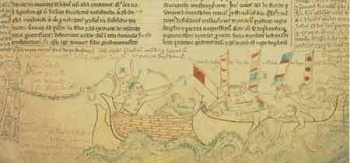The line which historians had adopted was that the principal landowners in Jersey, many of whom also had holdings in Normandy, were given the choice of which properties to retain, and the majority sided with King John, who retained the Channel Islands as his personal territory and in due course established their rights and privileges in the "Constitutions of King John".
Anniversary book
However, the book commissioned to commemorate the anniversary "Jersey 1204 - The forging of an island community" by eminent historians Judith Everard and Sir James Holt, tells a somewhat different and more complicated story.
They disclose that, in about 1200, King John granted the islands to Pierre de Préaux, a favourite Norman courtier, as a fief, along with other territory in Normandy. When Normandy was taken by the French king, Philip Augustus, in 1204, de Préaux, who was King John's representative at the fall of Rouen, had to surrender his terrorities to Philip, and the Channel Islands became French.
Technically they probably remained part of the Duchy of Normandy, as they had been before the Duke, William the Conqueror, added England to his territory in 1066, and as they remained for another 128 years with William's successors as both Duke of Normandy and King of England.
Gap in records
There are no records of events in the Channel Islands to cover the momentous upheaval which must have taken place between 1203 to 1205. Pierre de Préaux did not return to the service of King John until the summer of 1207, so he might have continued to hold the islands in fief of Philip Augustus. It is on record that de Préaux was offered 'forgiveness over the islands' when he returned to John's Court.
Historians had, until 2004's seminal work, shown the Islands remaining English in 1204 and shortly afterwards being attacked by a Eustace the Monk, a mercenary from the Low Countries, on behalf of the French. Everard and Holt suggest, however, that Eustace commanded a small fleet on behalf of King John, anda retook the islands he wanted back because of their strategic position in the English Channel. He had not give up hope of retaking his former possessions in mainland France.
Changes in allegiance
It is suggested that Eustace outstayed his welcome and was, toghether with his brothers, evicted from the main Channel Islands, to take up residence in Sark. Whether he was ejected from there in 1214 because he had switched his allegiance to France, or whether cause and effect were the other way round, he than appears to have assembled a large fleet at the time that French Prince Louis was trying to invade England and recaptured the Channel Islands, this time under the French flag. Louis was defeated, however, in a sea battle off Sandwich and Eustace was captured and executed. Louis negotiated a peace treaty with Henry III of England, included in which was the requirement that Eustace's brothers should give up their occupation of the Channel Islands.
Eustace was not the only player on the Channel stage in the early 13th Century who switched allegiance when it suited him. Geoffrey de Lucy was put in charge of Guernsey by King John from May 1206 but was one of the English barons who rebelled against their monarch and he was with Eustace when he invaded for the second time. By 1224 he was back on the English side as Warden of the English Coast, with responsibility for the Channel Islands until 1226, when Richard de Gray was appointed Warden of the Isles.
Landowners' choice
It has long been suggested that it was the decision of the majority of Jersey's principal landowners in 1204 to side with King John which was the determining factor in which country had eventual control, but it appears that it was not quite so clear cut. While England and France were fighting over the islands, those landowners with holdings in Jersey and Normandy were forced to decide which to abandon. Although while under English control they were permitted to travel to France on business, or to meet family, these visits were limited to eight days at a time. If they were away any longer they ran the risk of having their island property confiscated. It is believed that many chose to remain in Jersey, despite having a smaller property there than in Normandy, because there they were answerable only to the King, with no more senior Lords as their superiors. Effectively they chose to be big fish in a small pond rather than smaller fish in a larger pond.
There was still a risk that they could lose their Jersey holdings. Assizes were held before a jury of eight to determine whether some tenants-in-chief were "faithful" or "unfaithful", and some who lost their lands ultimately appealed to the King to try to get them back.
To further ensure the loyalty of his Jersey seigneurs, King John took hostages - family members who were held in England - although most of these had been returned by the time Eustace launched his second invasion.
